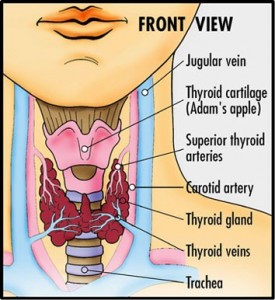AutoimmuneThyroid Conditions
Autoimmune conditions, including those that affect the thyroid gland, are more common in women than men. The thyroid gland is particularly susceptible to a variety of autoimmune conditions, including:
Hashimoto’s thyroiditis, which is most prevalent among women between 30 and 50 years of age. Symptoms include weight gain, cold sensitivity, muscle and joint pain, menstrual irregularities, increased cholesterol and decreased mood. Hashimoto’s is also found in gluten intolerant individuals, possibly due to the fact that the gluten protein closely resembles a protein found on the thyroid gland. When a gluten-intolerant person consumes gluten the immune response can include an errant attack on the thyroid gland.
Grave’s Disease, in which the thyroid gland becomes overactive. Signs include enlarged thyroid, mood and sleep disturbances, weight loss, tremor, irregular heart rate and, paradoxically, fatigue. Heart problems are the most serious complications of Grave’s disease and can involve atrial fibrillation and congestive heart failure — an inability of the heart to efficiently distribute blood to the body — from longterm over-stimulation.
Inflammatory Autoimmune Arthritis conditions, such as rheumatoid arthritis, lupus and Sjogren’s syndrome all may affect the thyroid gland. Women with rheumatoid arthritis show thyroid dysfunction at a rate three times greater than those with non-inflammatory rheumatoid conditions.
Natural methods for managing autoimmune thyroid disease include avoiding certain foods that affect thyroid function, such as soy, cabbage, kale and mustard greens and increasing levels of certain nutrients that decrease inflammation.
For more information and to learn about testing and natural treatment options for autoimmune thyroid disorders, call Dr. Roizman at (828) 225-5575.
